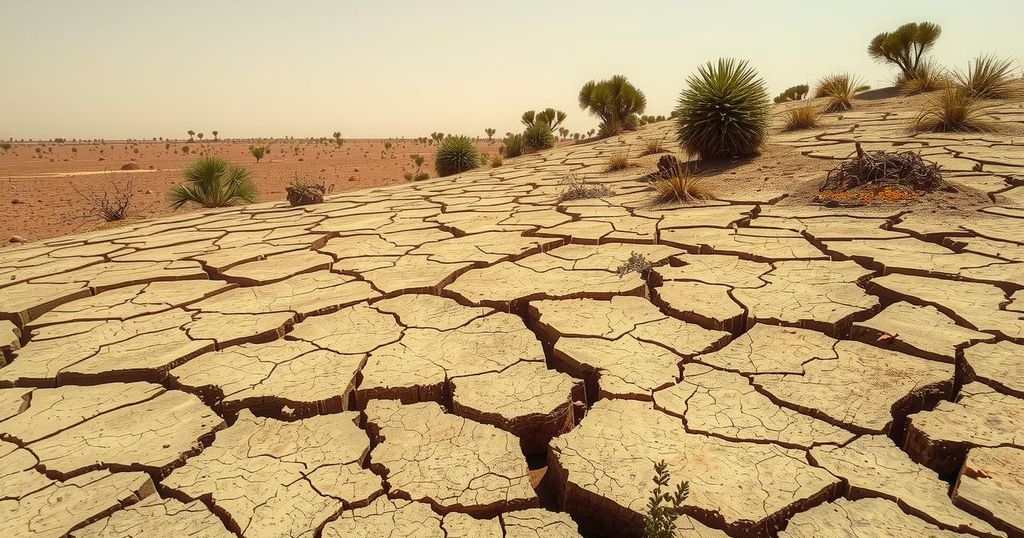OECD Report Foresees Significant Economic Impacts from Future Droughts in Paris Region

The OECD report warns that severe droughts could cost Paris and its surrounding areas €2.5 billion by the century’s end. Climate projections indicate worsening conditions after 2050, affecting agriculture and manufacturing. A need for better water management and infrastructure adaptation is emphasized to mitigate future risks. Immediate investment and strategic planning are crucial to ensure regional resilience against climate-induced droughts.
A recent report by the Organisation for Economic Cooperation and Development (OECD) has raised concerns regarding potential severe drought episodes in the Paris region, predicting economic damages up to €2.5 billion by the century’s end. Although Paris has not yet faced the extreme water shortages seen in cities such as Barcelona and Cape Town, climate projections indicate a worsening scenario, particularly post-2050.
The OECD report highlights the potential disruption of economic activities in the Île-de-France region, especially affecting the agricultural and manufacturing sectors. Jo Tyndall, director of the OECD Environment Directorate, emphasized, “The robust historical infrastructure of the region could prove insufficient to cope with future droughts.”
Historically viewed as water-rich, the Île-de-France has encountered average temperature increases of 2°C since 1990, raising the likelihood of droughts. The study warns that, within 25 years, conditions akin to those seen in Mediterranean regions in the late 20th century may appear, characterized by prolonged dry periods and significant agricultural decline.
Sophie Lavaud, the report’s lead author, pointed out the increased vulnerability of activities and populations, stressing the reliance on a network of four major reservoir lakes. These reservoirs are vital, providing significant river flow during droughts, yet the infrastructure may lead to complacency regarding future water scarcity risks.
The Île-de-France region, which is home to 19 percent of France’s population and accounts for one-third of the national economy, faces rising water demands due to ongoing development. Agricultural water requirements have more than doubled since 2012 and are projected to increase by an additional 45 percent by 2050.
Notably, a severe weather event similar to the historic 1921 drought could necessitate water usage restrictions for industry, agriculture, and river transport for over 150 days. The OECD’s analysis indicates that immediate economic losses from reduced industrial output and lower crop yields could represent two-thirds of the projected €2.5 billion economic impact.
The report emphasizes the importance of understanding water usage patterns, including seasonal variations, to ensure summer availability. It advocates for proactive measures to assess drought impacts and strategically allocate water resources to various users according to their needs.
As the report elucidates, existing regulations permit users unlimited withdrawals outside of drought periods, creating potential issues. Authorities are urged to reevaluate water allocation strategies to prevent future crises and address challenges arising from drought-related structural issues in buildings due to ground shrinkage.
Finally, the OECD’s proposed blueprint for resilience advocates innovative water infrastructure strategies, including rainwater harvesting and industrial wastewater recycling. However, the critical issue of funding these initiatives remains unresolved. The report warns that without significant investments now, future droughts could pose significant challenges to the Paris region’s resilience.
In summary, the OECD report presents a compelling case regarding the economic risks posed by future droughts in the Paris region. With potential damages estimated at €2.5 billion and increasing water demands, it is essential for authorities to proactively manage resources. A thorough understanding of water usage and infrastructure adaptation are critical components required to mitigate risks associated with climate change-induced droughts. Therefore, immediate investment and strategic planning are imperative to ensure the region’s resilience against coming challenges.
Original Source: www.rfi.fr






